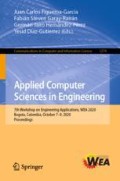Abstract
IRBASIR is a recently proposed algorithm that, inspired on one of the extensions of classical Rough Set Theory, employs similarity relations to learn classification rules. By using similarity relations as its underlying building blocks, IRBASIR is able to process datasets with both nominal and numerical features. In this paper we propose IRBASIR-Bayes, a modification to the IRBASIR method that relies on Bayesian Networks to construct the reference vector used to generate the rules. This scheme has demonstrated satisfactory performance compared to other rule induction algorithms.
Access this chapter
Tax calculation will be finalised at checkout
Purchases are for personal use only
References
Daniel, W.: Applied Nonparametric Statistics, 2nd edn. Duxbury Thomson Learning, Pacific Grove (2000)
Derrac, J., García, S., Molina, D., Herrera, F.: A practical tutorial on the use of nonparametric statistical tests as a methodology for comparing evolutionary and swarm intelligence algorithms. Swarm Evol. Comput. 1(1), 3–18 (2011)
Fernandez, Y., Coello, L., Filiberto, Y., Bello, R., Falcon, R.: Learning similarity measures from data with fuzzy sets and particle swarms. In: 2014 11th International Conference on Electrical Engineering, Computing Science and Automatic Control (CCE), pp. 1–6 (2014)
Filiberto, Y., Bello, R., Caballero, Y., Frias, M.: Algoritmo para el aprendizaje de reglas de clasificacion basado en la teoria de los conjuntos aproximados extendida. Dyna 78(169), 62–70 (2011)
Filiberto, Y., Bello, R., Caballero, Y., Frias, M.: An analysis about the measure quality of similarity and its applications in machine learning. In: Fourth International Workshop on Knowledge Discovery, Knowledge Management and Decision Support (2013)
Filiberto, Y., Bello, R., Caballero, Y., Larrua, R.: Using PSO and RST to predict the resistant capacity of connections in composite structures. In: González, J.R., Pelta, D.A., Cruz, C., Terrazas, G., Krasnogor, N. (eds.) Nature Inspired Cooperative Strategies for Optimization (NICSO 2010). Studies in Computational Intelligence, vol. 284, pp. 359–370. Springer, Heidelberg (2010). https://doi.org/10.1007/978-3-642-12538-6_30
Filiberto, Y., Caballero, Y., Larrua, R., Bello, R.: A method to build similarity relations into extended rough set theory. In: 2010 10th International Conference on Intelligent Systems Design and Applications (ISDA), pp. 1314–1319 (2010)
Fras, M., Filiberto, Y., Fernndez, Y., Caballero, Y., Bello, R.: Prototypes selection based on similarity relations for classification problems, October 2015
Grzymala-Busse, J.W.: A new version of the rule induction system LERS. Fundamenta Informaticae 31(1), 27–39 (1997)
Grzymala-Busse, J.W.: Mining numerical data – a rough set approach. In: Peters, J.F., Skowron, A. (eds.) Transactions on Rough Sets XI. LNCS, vol. 5946, pp. 1–13. Springer, Heidelberg (2010). https://doi.org/10.1007/978-3-642-11479-3_1
Keerthika, G., Priya, D.S.: Feature subset evaluation and classification using Naive-Bayes classifier. J. Netw. Commun. Emerg. Technol. (JNCET), 1(1) (2015). www.jncet.org
Kodratoff, Y., Michalski, R.S.: Machine Learning: An Artificial Intelligence Approach. Springer, Heidelberg (2014). https://doi.org/10.1007/978-3-662-12405-5
Quinlan, J.R.: C4.5: Programs for Machine Learning. Morgan Kaufmann Publishers Inc., San Mateo (1993)
Whittaker, J.: Graphical Models in Applied Multivariate Statistics. Wiley, Chichester (2009)
Witten, I.H., Frank, E.: Data Mining: Practical Machine Learning Tools and Techniques. Elsevier, San Francisco (2005)
Author information
Authors and Affiliations
Corresponding author
Editor information
Editors and Affiliations
Rights and permissions
Copyright information
© 2020 Springer Nature Switzerland AG
About this paper
Cite this paper
Coello, L., Filiberto, Y., Bello, R., Frias, M., Falcon, R. (2020). IRBASIR-B: Rule Induction from Similarity Relations, a Bayesian Approach. In: Figueroa-García, J.C., Garay-Rairán, F.S., Hernández-Pérez, G.J., Díaz-Gutierrez, Y. (eds) Applied Computer Sciences in Engineering. WEA 2020. Communications in Computer and Information Science, vol 1274. Springer, Cham. https://doi.org/10.1007/978-3-030-61834-6_3
Download citation
DOI: https://doi.org/10.1007/978-3-030-61834-6_3
Published:
Publisher Name: Springer, Cham
Print ISBN: 978-3-030-61833-9
Online ISBN: 978-3-030-61834-6
eBook Packages: Computer ScienceComputer Science (R0)

